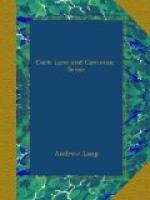Let us see how this theory works out in practice. Smith, Jones, Brown and Robinson are sitting with their hands on a table. All, ex hypothesi, are honourable men, ’above suspicion of intentional deception’. They ask the table where Green is. Smith, Jones and Robinson have no idea, Brown firmly believes that Green is in Rome. The table begins to move, kicks and answers, by aid of an alphabet and knocks, that Green is at Machrihanish, where, on investigation, he is proved to be. Later, Brown is able to show (let us hope by documentary evidence), that he had heard Green was going to Machrihanish, instead of to Rome as he had intended, but this remarkable change of plans on Green’s part had entirely faded from Brown’s memory. Now we are to take it, ex hypothesi, that Brown is the soul of honour, and, like Mr. Facey Rumford, ’wouldn’t tell a lie if it was ever so’. The practical result is that, while Brown’s consciousness informs him, trumpet-tongued, that Green is at Rome, ‘the residue of a forgotten impression’ makes him (without his knowing it) wag the table, which he does not intend to do, and forces him to say through the tilts of the table, that Green is at Machrihanish, while he believes that Green is at Rome.
The table-turners were laughed at, and many, if not all of them, deserved ridicule. But see how even this trivial superstition illuminates our knowledge of the human mind! A mere residuum of a forgotten impression, a lost memory which Brown would have sworn, in a court of justice, had never been in his mind at all, can work his muscles, while he supposes that they are not working, can make a table move at which three other honourable men are sitting, and can tell all of them what none of them knows. Clearly the expedient of table-turning in court might be tried by conscientious witnesses, who have forgotten the circumstances on which they are asked to give evidence. As Dr. Carpenter remarks, quoting Mr. Lecky, ’our doctrine of unconscious cerebration inculcates toleration for differences not merely of belief, but of the moral standard’. And why not toleration for ‘immoral’ actions? If Brown’s residuum of an impression can make Brown’s muscles move a table to give responses of which he is ignorant, why should not the residuum of a forgotten impression that it would be a pleasant thing to shoot Mr. Gladstone or Lord Salisbury, make Brown unconsciously commit that solecism? It is a question of degree. At all events, if the unconscious self can do as much as Dr. Carpenter believed, we cannot tell how many other marvels it may perform; we cannot know till we investigate further. If this be so, it is, perhaps, hardly wise or scientific to taboo all investigation. If a mere trivial drawing-room amusement, associated by some with an absurd ‘animistic hypothesis,’ can, when explained by Dr. Carpenter, throw such unexpectedly blinding light on human nature, who knows how much light may be obtained from a research into more serious




